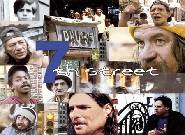|
|
||||
|
|
by Donald Levit  Just this afternoon on Public Radio, Constantin Costa-Gavras characteristically insisted that "all films are political, . . . a kind of monologue that we [directors] have with the audience." Sometime-actor Josh Pais’s 7th Street is a case in point, though directed as much to himself as to the audience. The result of documenting a reduced neighborhood for ten years, it reveals the young writer-director-producer’s own spiritual growth and emerges as a visual diary, one that serves as a cinematic psychiatrist couch and reflecting glass. In what he did not realize is actually a search for roots – what’s more American that that? – Pais returns from what he modestly terms a so-so acting career in London and Hollywood – e. g., Raphael in Teenage Mutant Ninja Turtles – to confront ghosts in the changing streets of his childhood and, equally, to come to terms with his own parents and heritage. Opposites attract. A homely Dutch scientist, his father was recruited to Princeton and Einstein by Robert Oppenheimer; his beautiful poetess-painter mother was Missourian, and after the divorce she and her only child settled in Alphabet City, the one area she could afford. Altering his clothes and manners according to place, the child Josh spent some time on his father’s intellectual Upper East Side but lived at his bohemian mother’s, where artists, poets, musicians and draft-dodgers congregated, crashed, talked and hid from the FBI. Once the East Side, now the trendy East Village, and dominated by the language, shops and stalls of Hungarian Jews, the original salt marshes that became East 7th Street were by the 1960s heavily Hispanic and black – virtually written off by City Hall and given over to garbage, abandoned buildings, alcohol and drugs. "The neighborhood had a flavor all its own," a unique racial and ethnic mix, but criminal harassment ruled. By himself, or with a few others, Pais set out to document, on Digibeta Cam, the life and people here. Winter or bare-chested summer – there seems no Fall or Spring – he collected archival footage, recorded boarded-up buildings and refuse-filled lots, but mainly he interviewed people. Included among his interviewees are: Manny, the tough but kindly and elderly Jew, reputedly the block’s only millionaire; Ángel, a Puerto Rican childhood friend and protector; cousin Rex and stoop-sitting Jackie, whose education is through talking with passers-by; homeless Merlin, omnivorous reader, alcoholic and self-styled "Street Greeter"; dancers, composers, scammers and drug runners and, among his dogs in a wintry rooftop "Garden of Eden," tall dignified Native American Rino Thunder, once the admiring lover of Josh’s mother Lila. Along the way, Josh marries Lisa and stops his ubiquitous open filming when the Drug Lord of the Alphabets threatens him and, by implication, his wife and son Zane. Painful and slow at decisions, he confers with his father and wife but decides that this barrio is, after all, their home as well as of the "street family" they love. Filming resumes after massive police action in 1998 clears out much of the serious danger and drugs. Now, however, in place of heroin and crack dealers, the "real estate dealers" have taken over. Balance is delicate, so "upwards" can upset it as well as "downwards." The old shops and hangouts close, replaced by chichi boutiques and French-named cafés; rents soar as buildings are renovated and upscale whites move in with expensive furniture. Gentrified, the streets lose life. Manny, Jackie, Merlin and others are dead, lost or leaving. All his dogs dead, too, a shirtless, sickly white and sagging Rino sits crying in Tompkins Square Park, the old apartment taken from him. With his resolution to remain on 7th Street, the director has at last come home. He and his film, part of whose proceeds go toward finding housing for Rino, represent hope for the future of city neighborhoods and the true quality of their life. Together with its written counterpart in Jane Jacobs’ The Death and Life of Great American Cities, this documentary should be required of students, politicians, developers and planners. To a man, the old-timers speak of "survival" in the streets. (The same is true of my own fast-disappearing Hell’s Kitchen, whose name suffers change, as well.) If great urban centers are indeed to survive as exciting, mixed and livable places, their individual communities must first be kept vibrantly diverse and thus alive. (Released by Paradise Acres Productions; not rated by MPAA.) |
||
|
© 2025 - ReelTalk Movie Reviews Website designed by Dot Pitch Studios, LLC |



